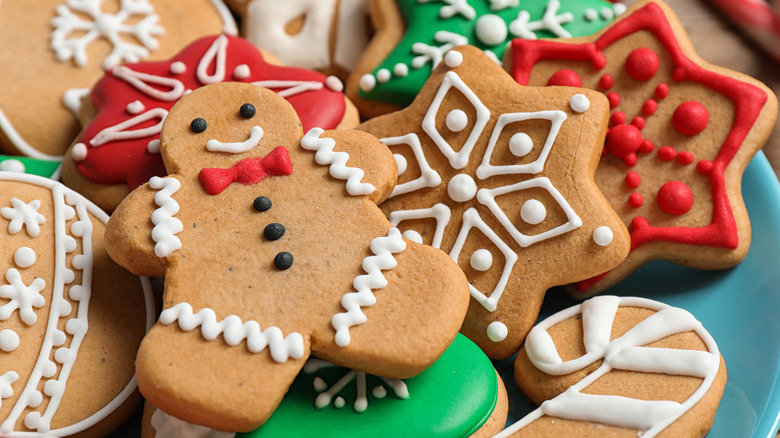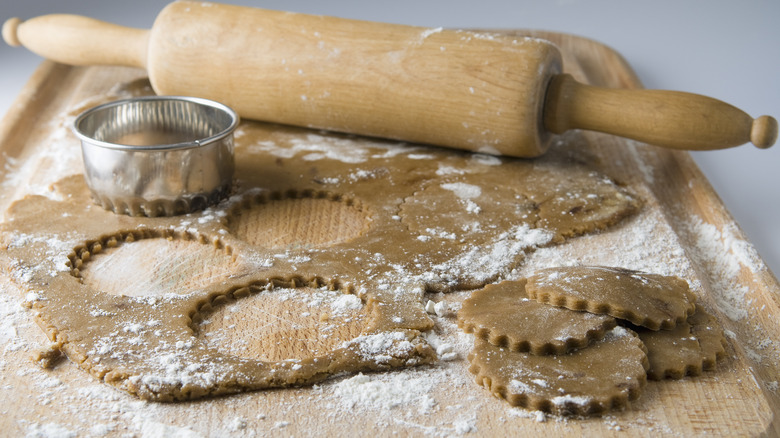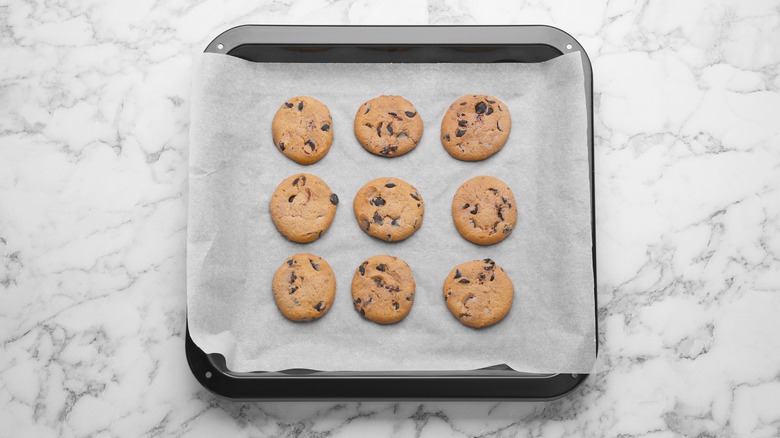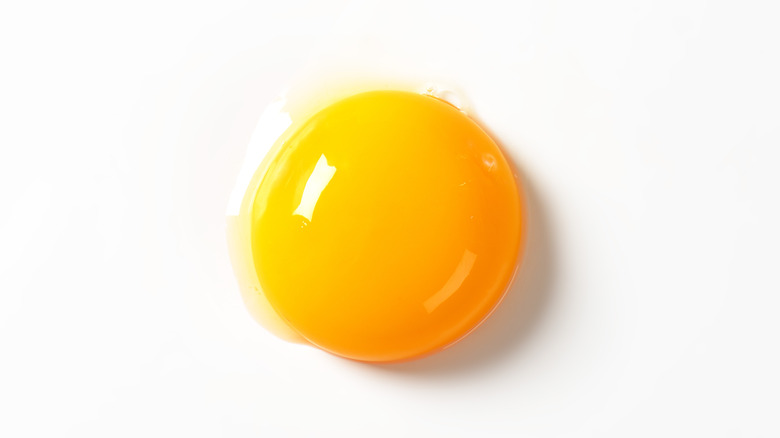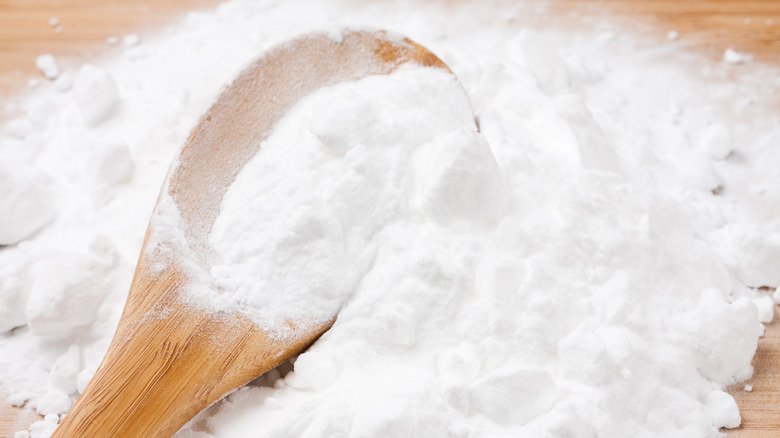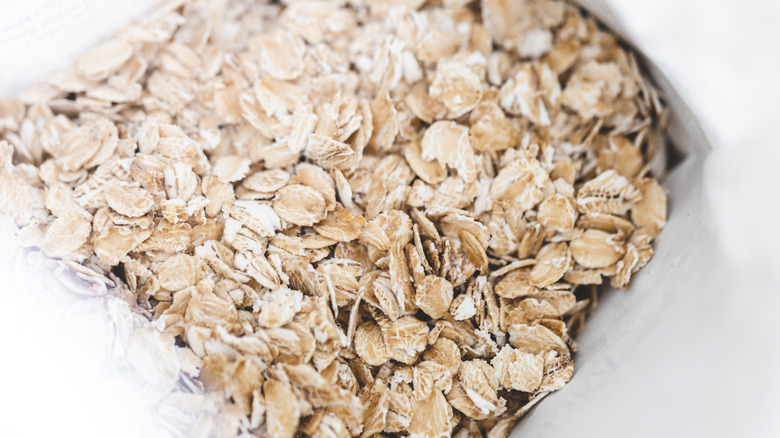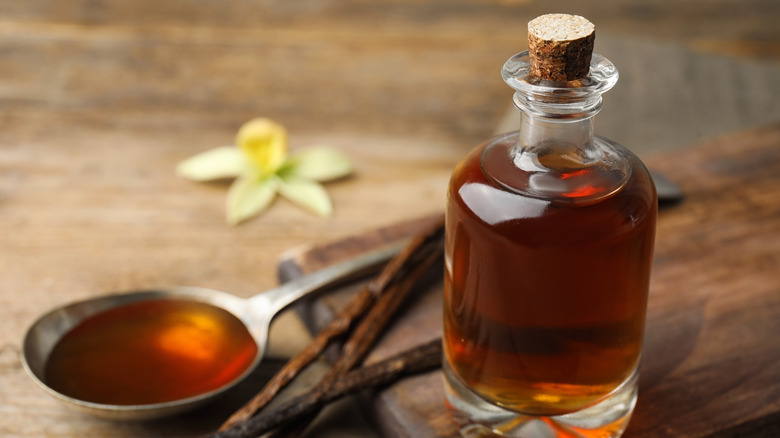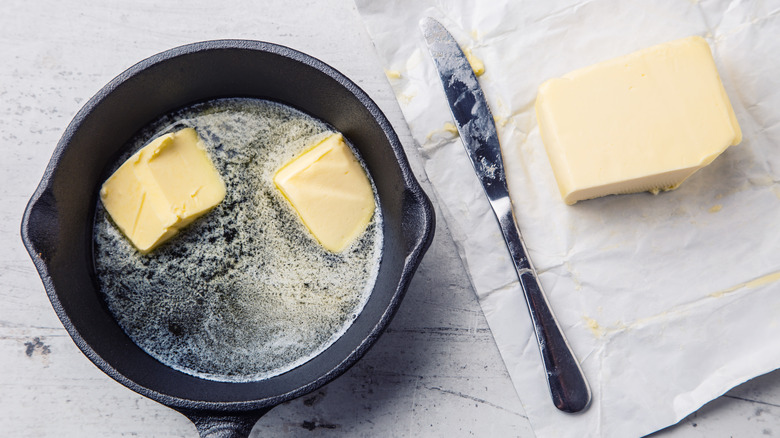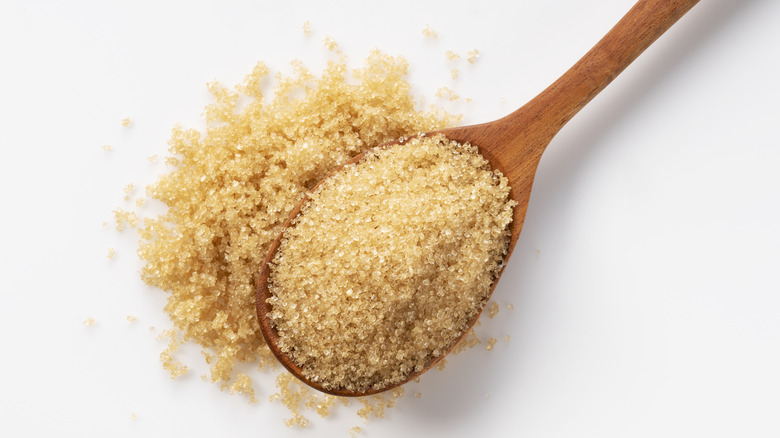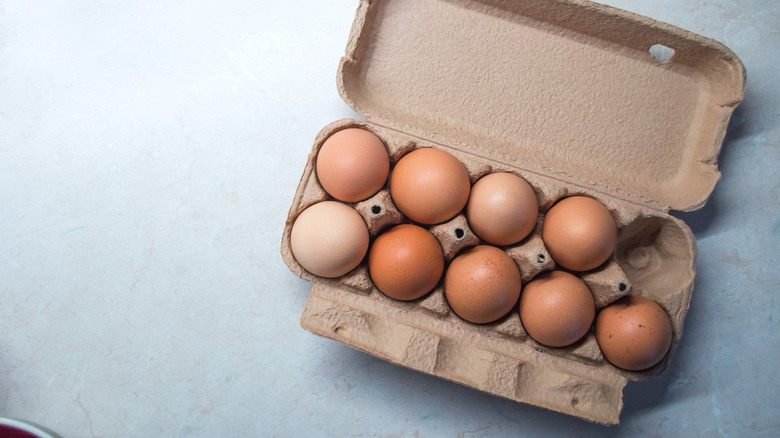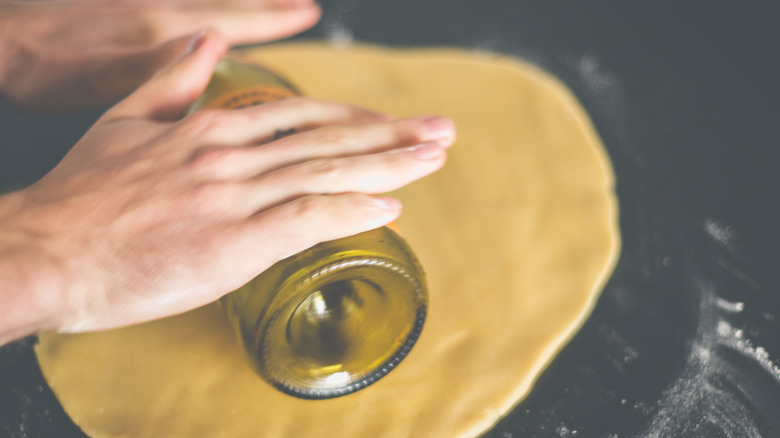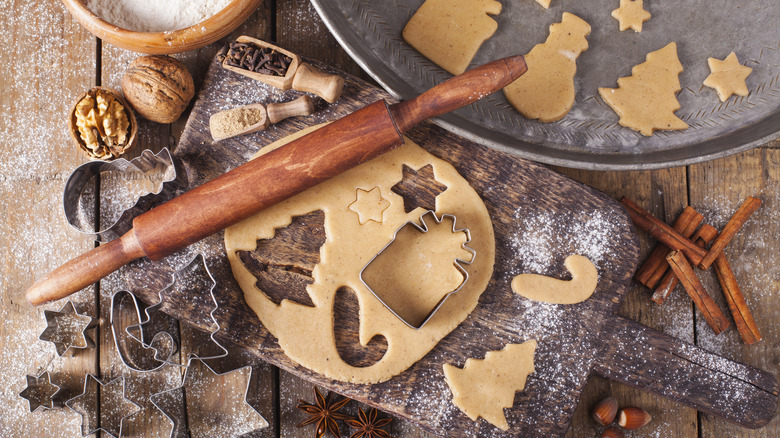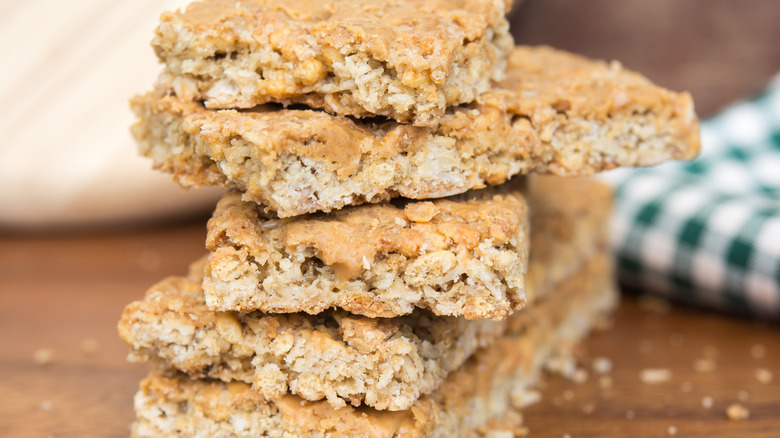14 Easy Christmas Cookie Hacks
If there's one thing we're confident in, it's that we know our way around a holiday cookie swap. We love a classic chocolate chip cookie as much as a modern twist like a matcha gingerbread cookie. What about chocolate chip laced with maple syrup (for when you're rewatching "Elf") or a homemade Oreo recipe? The thing they all have in common is that they can all use a few tips to ensure easier baking and foolproof recipes.
When cooking during the holidays, making sure you have soft butter (and fast) or ensuring your cookies are fluffy can go a long way. Regardless of the sweets you're making, taking an extra step with the freezer or browning butter are simple steps that are easy to incorporate. Whether you're a Christmas cookie veteran or are making cookies for Santa for the very first time, here are our best tips for your holiday baking marathon.
1. Refrigerate your cookie dough
When it comes to baking, the temperature of the ingredients you're using really matters, especially when you're working with butter. Although there are certain types of cookie dough you shouldn't refrigerate, there are others that definitely need some time in the fridge before they go into the oven. Why? Well, that cool time keeps the butter from melting so quickly. When butter in a dough melts right away, it causes the cookie to spread out. That might be ideal when you're making chocolate chip cookies, for instance, but it's not what you want when you're baking Christmas sugar cookies.
Therefore, after you're done making your dough and mixing it all together, put it in the fridge so it has some time to cool down before you start baking. You can leave the dough in the fridge for a considerable amount of time, but even 15 to 20 minutes will make a difference in reducing spreadability. Just remember to form your balls of dough relatively quickly after you take the dough out of the fridge — if you leave it out for too long, that butter will start to melt again, negating all that cooling time.
2. Bake your cookies on parchment paper
What do you need to add to the dough to ensure your cookies come out perfectly every single time? You may need to spend less time worrying about the ingredients themselves and spend more time thinking about what, exactly, you're baking your cookies on.
Although you can bake your cookies directly on the baking sheet, you could run into some problems if you decide to take this route. You'll have to grease the pan, which can be messy but can also create textural problems with your cookies. All that extra fat can cause your cookies to spread out more quickly than they otherwise would, which isn't ideal, especially when it comes to Christmas cookies that should keep their shape.
Therefore, you may want to think about grabbing some parchment paper the next time you're at the grocery store. Parchment paper creates a heat-resistant layer between the baking sheet and your cookies, which means you won't have to pry them off the sheet once they're done baking. Plus, you won't have to worry about that melted butter affecting the way your cookies turn out. It's a simple, easy hack that can make a huge difference in the final product.
3. Add an extra egg yolk
Most of us follow cookie recipes without changing anything, convinced that if we do, our cookies will turn out a mess. That may be true in some cases, but that doesn't mean you shouldn't experiment with different baking methods. One Christmas cookie hack that we love to employ is adding an extra egg yolk to the chocolate chip cookie dough. This additional ingredient will yield cookies with more flavor, thanks to the lecithin and fat within the yolk, but it'll also have an effect on texture as well: The results are likely to come out of the oven feeling lighter and less dense.
While egg whites often have a drying effect on cookie dough, you won't experience that if you only use the yolk of the egg. Instead, it'll give your cookies a softer, more velvety texture that can make all the difference once your family starts digging into the dessert. Try this simple Christmas cookie alteration, and you may never go back to a single-yolk cookie dough again.
4. Use baking soda and an acid
There's nothing like the feeling of taking a batch of cookies out of the oven only to discover that they haven't spread out like they were supposed to. Instead of being nice and thin and perfectly spread out, the cookies are tight, thick, and too crumbly. It's a problem that many of us have encountered, but if you're not a super-experienced baker, you may not have realized what the problem was.
According to chef Christina Tosi, creator of the wildly popular Milk Bar and cookie-baking expert, there's a simple solution: baking soda and some kind of acid. Tosi recommends using either buttermilk or lemon juice for the acid. By adding these ingredients to your cookie dough, she says, your dough will spread out more evenly, and you won't get those weird, super thick cookies. Don't have buttermilk or lemon juice on hand? Cocoa powder will also work, and it'll give your cookies a nice, chocolatey touch of flavor.
5. Utilize old fashioned oats for a different texture
It's true that in many ways, Christmas cookies are all about tradition. Maybe you still make that same old recipe your grandma showed you when you were a kid, or perhaps you never let a holiday go by without baking a sheet of your dad's favorite sugar cookie. But that doesn't mean you can't start new Christmas cookie traditions. One cookie switch-up that we absolutely love is subbing some of the all-purpose flour for old-fashioned oats instead.
You've probably had an oatmeal raisin cookie before, and even if you're not a big raisin person, you can probably understand the hype: Cookies made with old-fashioned oats have a lovely, chewy texture to them you won't get in a cookie only made from flour. If you want to try something different with your Christmas cookies this year, add a bit of old-fashioned oats to your cookie batter. Just keep in mind that they tend to soak up more liquid than plain flour, so you may have to adjust the wet components of the dough accordingly.
6. Find good-quality vanilla extract
If you don't tend to bake on a regular basis, you might not have any vanilla extract on hand. When you go down the baking aisle at your local grocery store, you may notice that there are several different types of vanilla to choose from. So, which one will work the best for making excellent Christmas cookies, you ask? Well, you're going to want to look for actual vanilla extract, not imitation vanilla. Real vanilla extract will give your cookies a much more complex flavor than the cheap, one-note imitation flavorer.
Of course, vanilla extract tends to be a bit more expensive than its processed counterpart, but if you can afford to spring for the good stuff, you can. While you may be able to skip the expensive flour by opting for the all-purpose stuff, real vanilla extract will make a big enough difference that you won't want to skip it just to save a buck.
7. Add candy to your Christmas cookies
Have some leftover candy for Halloween? Or maybe you just keep the sweet stuff in your house whenever you randomly get a craving. Well, it may not have occurred to you before, but you can actually incorporate that candy into your cookie recipes. For example, maybe you're following a standard chocolate chip cookie recipe, but you want to switch things up and make them more interesting. In that case, you may want to crush up those Kit Kats or Snickers bars and use them instead of chocolate chips. The result will be a more creative, more richly flavored batch of cookies.
Of course, you don't have to do anything too wild if you're just trying to quickly upgrade a holiday cookie recipe. Even candy as simple as M&M's can make a fun, colorful addition to an otherwise ordinary holiday cookie spread. Just be creative, and don't be afraid to experiment with all of your favorite candies — you may just create your family's new favorite Christmas cookies.
8. Brown your butter
For an added wallop of caramelized undertones and nutty flavor, brown your butter before you begin your recipe. This added complexity can add richness to your cookies that will keep you and your fellow cookie-eaters coming back for more. Plus, using melted butter in lieu of solid butter also makes an extra-dense and chewy cookie, which, in our opinion, is the best kind of cookie ever. If that's not your preferred style of cookie, of course, then you might consider going easy on the browned butter. But in our view, it's worth experimenting to please a range of tastes — and we think this is one you'll acquire rather quickly.
If you're in a time crunch and need softened butter fast, we also have some easy hacks that will have you whizzing away at the KitchenAid in no time. You can either grate the butter or steam it to make baking that much easier.
9. Revive your brown sugar
You know what's a real nightmare before Christmas? Grocery shopping on Christmas Eve. Nobody wants to run out when you're down to the holiday wire. But finding that your brown sugar has become too hard — thus making it difficult to get your cookie batter smooth — is the kind of kitchen bummer that no baker needs at the last minute.
Long grocery checkout lines aren't necessarily in your future, though. Just some of our tips to revive hard brown sugar. For example, you can use a microwave to heat up hard brown sugar with a wet paper towel that will help it regain moisture and morph out of brick form. You can also turn to a food processor or box grater to break down any clumps that are being stubborn. Makes a lot more sense to be able to use what you have and can make baking a lot easier without braving the crowded baking aisle.
10. Get your eggs to room temperature
So much work in the kitchen comes down to thinking and planning ahead. Still, sometimes the simplest tasks become the easiest to forget, and, in this case, can have major consequences.
Pulling all of your ingredients out of the fridge right before baking can be a huge mistake — particularly eggs. Taking the time to let your eggs reach room temperature is a simple step that makes a large impact. Dumping cold eggs into nicely creamed butter and sugar can cause clumps to form in your dough. Make sure all your ingredients are at room temperature so your cookie dough has an easier time coming together. If you're in a rush, there are several ways you can bring eggs to room temperature, from covering them with a warm bowl to just running them under warm or hot water. A simple water bath will do the trick, too.
11. Use a wine bottle as a rolling pin
You might not own a nice French rolling pin for flattening out your cookie dough, but there's a good chance you do have a few empty wine bottles lying around. If you're baking cookies, that's a good thing. A wine bottle is smooth and about the same size as a rolling pin and works great in a pinch. Plus, if you only have one pin and need some support in the baking arena, a wine bottle is an easy substitute during heavy cooking sessions.
In fact, a wine bottle might actually work even better than a rolling pin since the glass will stay cooler for longer. A cool bottle will avoid heating up the dough and make the rolling process easier. Its neck also essentially functions as a ready-made handle, and the bottle's smooth surface will ensure your dough is even all around.
12. Freeze cookie cutouts prior to baking
Have you ever spent a bunch of time making Christmas cookies only to take them out of the oven and realize that they've completely spread out and that they don't even look like the shapes you cut them into anymore? It's a common problem that people run into when they're baking Christmas cookies, and it can be a real bummer — you probably don't want to pass out misshapen Christmas trees to your neighbors.
Why does this happen, anyway? Most of the time, this spreading out process happens when the butter in the cookies melts too quickly. Of course, freezing your cookie dough ahead of time helps prevent this, but if you're still suffering from flat, spread-out cookies, you may want to freeze the cutouts before you place them in the oven. This extra freeze time will help ensure you won't get those sad, misshapen candy cane shapes ever again.
13. Try cookie bars for baking ease
Distracted bakers, this tip is for you: Bars are the way to go. Instead of rotating out multiple sheet pans every 15 minutes, make a few baking pans of cookie bars. Your cookie quota will be done in a fraction of the time and you won't have to worry about separating the dough. The bars can be chewy and layered with frosting or chocolate for an added hit of sweetness.
You really can't go wrong with whatever cookie you choose for this — a simple sugar cookie recipe will more than do the trick. Or, for a dessert with a little more complexity, try this chocolate tahini bar recipe. The tahini provides a nutty flavor throughout the bars and complements the chocolate perfectly, turning this into a treat that's both sweet and savory. (And no, we won't stop you from adding some holiday sprinkles on top!)
14. Stick to royal icing for sugar cookies
Not too experienced with icing cookies? You're not alone. For many of us, cookie icing is really only something that comes up on Christmas. The rest of the year, you may make a wide range of cookies without thinking about icing them once. However, once the holidays roll around, you may want to take that time to decorate cookies with family and friends for a more festive dessert experience.
If you're looking for the perfect kind of icing for making roll-out sugar cookies, you'll want to search for royal icing. This type of icing has the perfect consistency for decorating Christmas cookies, as it's spreadable and isn't too thin or thick. Additionally, it has a decent shelf life, which is probably what you're looking for when you bake cookies a week ahead of the holiday. In most grocery stores and baking supply stores, you can find a wide variety of royal icings that are ideal for decorating Christmas cookies. Can't find royal icing in the baking aisle at your local grocery store? Not a problem. Just make some yourself by mixing powdered sugar, egg whites, and water. Seriously, is there anything a Ziploc bag can't do? Just cut off the corner of a bag, and there you have it: a piping bag.
